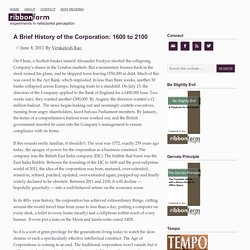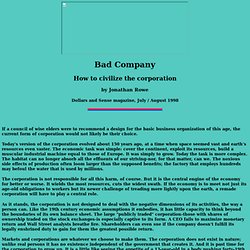

A Brief History of the Corporation: 1600 to 2100. On 8 June, a Scottish banker named Alexander Fordyce shorted the collapsing Company’s shares in the London markets.

But a momentary bounce-back in the stock ruined his plans, and he skipped town leaving £550,000 in debt. Much of this was owed to the Ayr Bank, which imploded. In less than three weeks, another 30 banks collapsed across Europe, bringing trade to a standstill. On July 15, the directors of the Company applied to the Bank of England for a £400,000 loan. Two weeks later, they wanted another £300,000. If this sounds eerily familiar, it shouldn’t.
In its 400+ year history, the corporation has achieved extraordinary things, cutting around-the-world travel time from years to less than a day, putting a computer on every desk, a toilet in every home (nearly) and a cellphone within reach of every human. So it is a sort of grim privilege for the generations living today to watch the slow demise of such a spectacularly effective intellectual construct. Arthur C. Reach versus Power II. "All Men Are Created Equal" and Slavery: What Did Thomas Jefferson Mean by 'All Men Are Created Equal'? With its eloquent declaration of equality and human rights, the Declaration of Independence is one of the most influential and moving documents in western history.

Yet while declaring some of the most noble sentiments in history, it nevertheless was signed by men who in some cases practiced and in all cases tolerated slavery, one of the greatest evils in world history. What did Thomas Jefferson and the Second Continental Congress mean by the words "all men are created equal"? Frederick Douglass vs. Alexander Stephens On July 4, 1852, the abolitionist leader and former slave Frederick Douglass delivered a scathing rebuke to the hypocrisy of America's celebration of freedom in the shadow of slavery.
Several years later, the white supremacist Alexander H. Frederick Douglass had every reason to take the United States to task for the nation's hypocritical acceptance of slavery, but it's interesting that his take on Jefferson's ideals differed from that of Stephens' in the way that they did. Bad Company corporations. By Jonathan Rowe Dollars and Sense magazine, July / August 1998 If a council of wise elders were to recommend a design for the basic business organization of this age, the current form of corporation would not likely be their choice.

Today's version of the corporation evolved about 150 years ago, at a time when space seemed vast and earth's resources even vaster. The economic task was simple: cover the continent, exploit its resources, build a muscular industrial machine equal to those of Europe. It was simply to grow. The corporation is not responsible for all this harm, of course. As it stands, the corporation is not designed to deal with the negative dimensions of its activities, the way a person can. Markets and corporations are whatever we choose to make them. The strange part is that's pretty much where the corporation started-a broader bottom line. To piece it together again, we need to understand that the original business corporations in the United States grew out of a bargain.